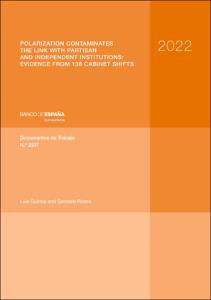Registro completo de metadatos
| Campo DC | Valor |
|---|---|
| dc.contributor.author | Guirola, Luis |
| dc.contributor.author | Rivero, Gonzalo |
| dc.date.accessioned | 2022-11-07T15:50:35Z |
| dc.date.available | 2022-11-07T15:50:35Z |
| dc.date.issued | 2022-11-07 |
| dc.identifier.issn | ISSN: 1579-8666 (en línea) |
| dc.identifier.uri | https://repositorio.bde.es/handle/123456789/23546 |
| dc.description.abstract | Increasing political polarization implies that each election expands the gap between the supporters of the losing side and the winning party. This asymmetry in how citizen’s feel about the outcome of elections could propagate to the institutions under partisan control but also to those designed to be isolated from electoral pressures – such as courts or central banks. Leveraging three decades of surveys covering European 27 countries, we exploit 138 cabinet shifts between 1991 and 2019 to estimate the effect of a growing divide between winners and losers on attitudes towards both types of institutions. We find that trust in either type institutions drops around elections but that the magnitude of the drop varies substantially across contexts. The polarization of parties explains most of this variance, suggesting that, in a polarized environment, partisan hostility can contaminate attitudes towards the political system as a whole creating the conditions for democratic backsliding. |
| dc.description.abstract | Increasing political polarization implies that each election expands the gap between the supporters of the losing side and the winning party. This asymmetry in how citizen’s feel about the outcome of elections could propagate to the institutions under partisan control but also to those designed to be isolated from electoral pressures – such as courts or central banks. Leveraging three decades of surveys covering European 27 countries, we exploit 138 cabinet shifts between 1991 and 2019 to estimate the effect of a growing divide between winners and losers on attitudes towards both types of institutions. We find that trust in either type institutions drops around elections but that the magnitude of the drop varies substantially across contexts. The polarization of parties explains most of this variance, suggesting that, in a polarized environment, partisan hostility can contaminate attitudes towards the political system as a whole creating the conditions for democratic backsliding. |
| dc.format.extent | 26 p. |
| dc.language.iso | en |
| dc.publisher | Banco de España |
| dc.relation.ispartof | Documentos de Trabajo / Banco de España, 2022 |
| dc.rights | Reconocimiento-NoComercial-CompartirIgual 4.0 Internacional (CC BY-NC-SA 4.0) |
| dc.rights | In Copyright - Non Commercial Use Permitted |
| dc.rights.uri | https://creativecommons.org/licenses/by-nc-sa/4.0/deed.es_ES |
| dc.rights.uri | http://rightsstatements.org/vocab/InC-NC/1.0/ |
| dc.subject | Institutions |
| dc.subject | Trust |
| dc.subject | Polarization |
| dc.subject | Instituciones |
| dc.subject | Confianza |
| dc.subject | Polarización |
| dc.subject | Decisión colectiva |
| dc.title | Polarization contaminates the link with partisan and independent institutions: evidence from 138 cabinet shifts |
| dc.type | Documento de trabajo |
| dc.identifier.bdebib | 000473489 |
| dc.identifier.bdepub | DTRA-202237-eng |
| dc.publisher.place | Madrid |
| dc.subject.bde | Política |
| dc.subject.bde | Economía del bienestar |
| dc.publisher.bde | Madrid : Banco de España, 2022 |
| dc.publisher.bde | Madrid : Banco de España, 2022-11-07 |












